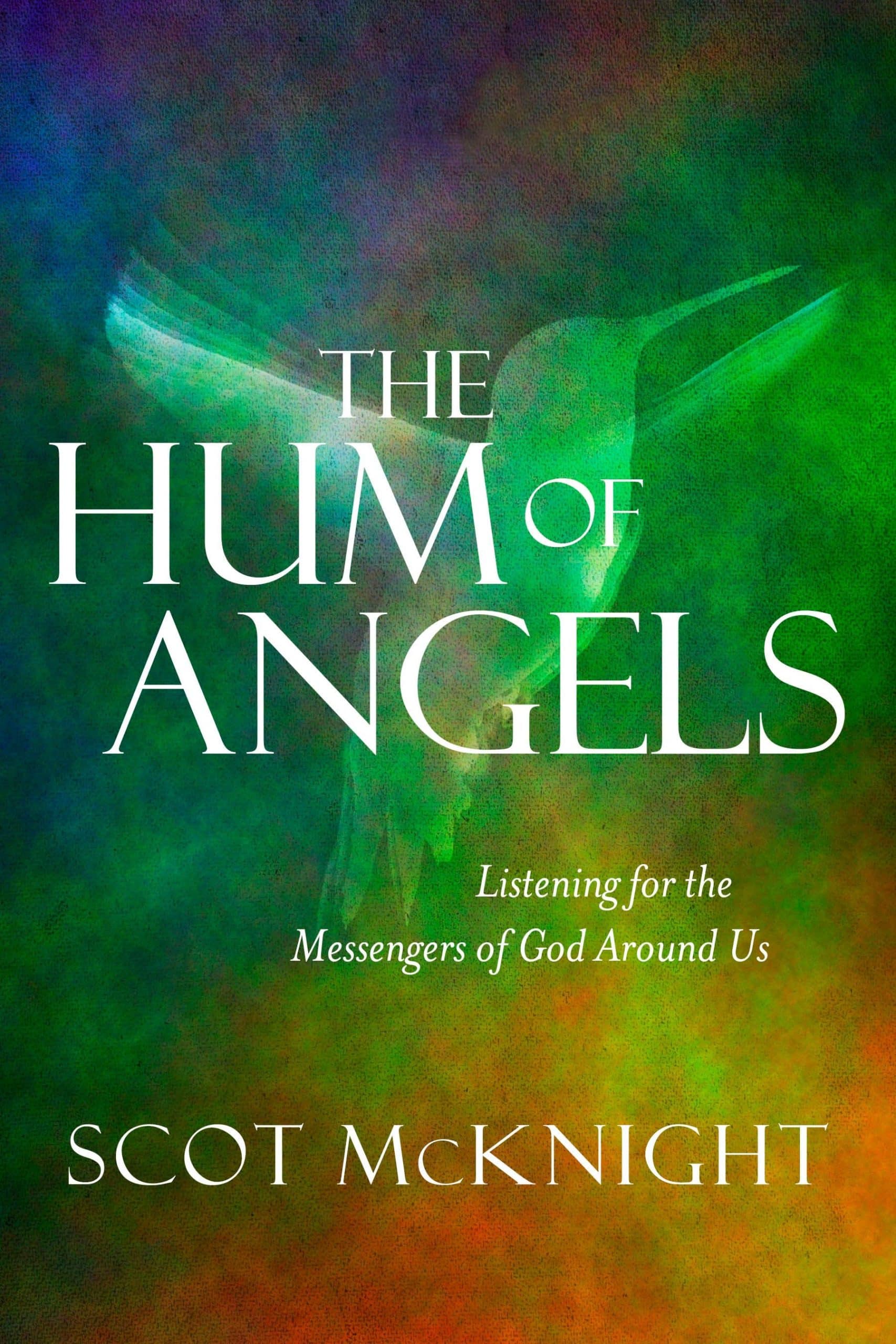The Hum of Angels: Listening for the Messengers of God Around Us
13.00 JOD
Please allow 2 – 5 weeks for delivery of this item
Add to Gift RegistryDescription
Would You Recognize an Angel if You Saw One? The majority of earth’s inhabitants believe in Angels. Yet so few of us can claim to have seen one. Why? Perhaps it’s because in order to encounter one, we first have to learn what to look for and how to look! We live in a world where the natural and supernatural overlap. Angels are constantly on mission from God and constantly at work in this world. From the Garden of Eden to the Book of Revelation, Scripture is filled with hundreds of references to these wondrous creatures. In this creative work, Scot McKnight explores what the Bible says – and doesn’t say – about these majestic beings. And that’s deeply important because angels are still on mission today. They express God’s love, confirm His presence, and even lead humans in redemptive worship. Don’t just believe in angels. Learn how to recognize these messengers of God that are all around us and know how God might be using them to affect our lives. Now available in a convenient paperback edition, The Hum of Angels illuminates what the Bible says about these heavenly beings; and it helps you to understand the deepest truths about one of God’s most magnificent and yet misunderstood creations. Most People Believe in Angels. It’s What we Believe About them that Matters. Believing in angels is one thing. But how can we know what angels are really like – especially when our preconceived notions have been mostly shape by sensationalized misinterpretations of these wondrous beings? To help sort things out, Scot McKnight untangles fact from fiction on topics such as: * Do loved ones become angels when they die? * Can we hear from angels? * Is there a hierarchy of angels? * Do we have a specific guardian angel? * Should we be scared of angels? * Are cherubs and seraphs different creatures than angels? * Do angels have wings? * Are angels worship leaders?
Additional information
| Weight | 0.19 kg |
|---|---|
| Dimensions | 1.58 × 13.14 × 20.32 cm |
| PubliCanadation City/Country | USA |
| Author(s) | |
| Format | |
| language1 | |
| Pages | 224 |
| Publisher | |
| Year Published | 2018-7-17 |
| Imprint | |
| ISBN 10 | 1601426321 |
| About The Author | Scot McKnight (PhD, University of Nottingham) is professor of New Testament at Northern Seminary in Lisle, Illinois. He is the acclaimed author of more than sixty books, including The Jesus Creed, The Heaven Promise, and Open to the Spirit. He regularly speaks at venues such as Catalyst, the Q Conference, and churches throughout the world. Scot and his wife, Kris, live in the Chicago suburbs. |
“Books on the angelic in the Bible are usually of varying quality—so fluffy and story filled they lack a coherent basis in Scripture, or so impenetrably philosophical one can’t apply them to the normal Christian life. Scot McKnight’s The Hum of Angels carefully avoids all these pitfalls and presents a sound and balanced biblical vision of God’s angelic realm and its work. He helpfully reimagines the ministry of angels, while keeping his work rooted in and framed by Scripture. The Hum of Angels is a worthy addition to the library of anyone wanting a solid, insightful, and scriptural view of God’s angelic ministers.” —Jonathan Macy, author of In the Shadow of His Wings and minister in the Church of England“Angels are everywhere! Until I read this book, I must confess that even as a Bible teacher I’d missed how ever present angels are at key junctures and in critical ways throughout the biblical story. As a pastor, I’d been mostly blind to the angels all around us (which most people in our church body, statistics show, more readily see). This wonderful book opened not only my eyes but my ears to the beautiful hum of angels surrounding us—a harmony that points us to the melody of Jesus at the center.” —Joshua Ryan Butler, pastor at Imago Dei Community, Portland, OR; author of The Skeletons in God’s Closet and The Pursuing God“I make a practice of reading everything Scot McKnight writes because I learn so much from his bright mind and generous spirit. His work exemplifies an intelligent, rich way of understanding the Bible; and this wonderful book is no exception. After having read The Hum of Angels, I’ll walk through my day with more awareness of God’s loving presence and comfort, and more hope because of it.” —Shauna Niequist, New York Times best-selling author of Present over Perfect“In The Hum of Angels, Scot McKnight invites us to consider the active and significant role angels play on the pages of Scripture and in fulfilling the purposes of God today—not for the sake of information, but for the sake of hope. How easy it is for us, from our ground-level perspective, to give discouragement and despair the upper hand. This reminder of the powerful activity of myriads of God’s angels on our behalf is one more reason for hope to thrive in the future of God’s ultimate victory over evil. This book is an eye-opening, reassuring, and hope-filled read.” —Carolyn Custis James, author of Half the Church: Recapturing God’s Global Vision for Women and Malestrom: Manhood Swept into the Currents of a Changing World"In the Hum of Angels Scot opens your mind to the true nature of angels as reported in the Bible and through history. I had no idea there were so many times that angels were present throughout the biblical story. I agree with Joshua Butler, it opened not only my eyes, but my ears to the beautiful hum of angels surrounding us. The book is divided into 4 major sections:1. In defense of angels2. God’s loving presence in angels3. God’s loving advocacy from angels.4. God’s loving transformation through angels. Scot maintains that 'If you believe in God, you also believe in angels.' Angels are not to be considered supernatural beings but rather an important moment that the person depicted it as an encounter with a messenger of God. Most of us believe in the angels that announced the birth of Christ, and made their appearance at His death, but this book illustrates time and time again the special moments throughout scripture. He does include some personal narratives of visitations with angels but by and large this is a detailed retelling of all the Bible accounts.I thoroughly enjoyed this book and the exploration of the history of angels. The various types of advocate, guidance, announcement, temptation, and warrior angels, to mention a few of the various types, was spiritually uplifting. The exploration of the Catholic and Episcopal Church histories was great." —Lamplighter |
|
| Excerpt From Book | I was visiting a bird-supplies store when I mentioned to the owner that my wife and I had owned a hummingbird feeder but had never once seen a hummer at the feeder, so we tossed it out. I concluded that there were no hummers near our home.The shop owner asked where we lived, I told him, and then he said, “They are there. Not only do some of your neighbors have hummers on their feeders, but hummers are all over the village.” What he said next was the take-home line: “You just have to have eyes to see them. Once you do, you will see them everywhere. They are small and fast and camouflaged, but they are not that hard to spot.”Eventually we bought a new feeder, filled it, and waited until our eyes got accustomed to the sight of hummers. Kris and I now see them everywhere. When other people go on a walk with us, we often observe a hummer— but it is rare that our friends spot one. It takes experience. You need to learn to spot them out of the side of your eyes and acclimate to their habits of zooming and darting and taking shelter on obscure branches and even on telephone lines. But once you’ve learned to spot a hummer you will see them everywhere because they are everywhere.Like angels. They, too, are all around us. Few of us have seen one because we first have to learn what we are looking for. In a good book about angels, Martin Israel, quoting a friend, wrote this: “Eternity lies all round us and only a veil prevents us seeing it.”1 The hum of angels surrounds us, and we only need ears to hear it or eyes to see them. Or perhaps a special sense for them. After all, the Bible tells us that Balaam’s donkey could see an angel that Balaam himself could not see. The passage suggests that Balaam was so insensitive to God that he failed to notice.* At the end of her survey of angels, Jane Williams, author of an important book on angels, invites us to hear and join in the chorus:Behind, around, underneath, and through the day-to-day world that we inhabit is the song of the angels. It is beautiful, endless, joyful, and terrible. It will be sung whether we join in with it or not, but imagine the sensation of stepping into that angelic harmony and being caught up in its power and majesty. This is what the angels invite us to do. They long to teach us their song, so that we, with them, can sing a hymn of praise to the glorious universe and its maker.2It should not bother us that dimensions of reality exist that we cannot see. Dogs can hear sounds we cannot hear; birds can migrate up and down the globe with a sense of direction that far exceeds our own; those little hummingbirds somehow know when to head north and when to head south, and all of a sudden they disappear from our summer feeders. Their sense of timing is unerring. Squirrels can somehow smell or feel nuts planted underground for winter storage; and bees . . . well, bees are a world unto themselves.And those examples are just a few of the creatures living on earth. God knows vastly more than we do; God sees and senses vastly deeper than do we. So why should we think that only what we see, hear, or sense is all there is? There is a popular conviction that we can believe only in what we see and feel. The best word for this posture is arrogance. Bold and not beautiful.Kris was driving through a wooded area the other day on the way to her office when a deer, seeming to suddenly notice her, stopped just before running into her lane of traffic. Had it continued on its initial path, Kris could have been in a serious accident. The timing was right for it to have happened. But she called me later and said the deer’s moves were so unusual she wondered if she had been protected by an angel.As it is with spotting hummingbirds, experience is our teacher. Kris’s story reminds me of another one. At the time of this previous experience, we did not consider the involvement of an angel. But on further reflection perhaps we should have. (Jet lag might have prevented us from thinking this way at the time.)We were on vacation in Italy. After landing in Milan in the north, we drove east toward Venice and had as our first night a stop in Verona. Having arrived in Verona, we quickly realized the city seemed like circles inside circles. We asked someone for help, and he pointed us forward, but after just one curve we were lost again. And jet-lagged.Suddenly a kind man appeared at our car window. I showed him the name of our hotel, and he said, “Can I get in your car? I’ll direct you to the hotel.” Which he did, and we were overjoyed. We got out of our car and turned to thank him, but he seemed to disappear with a shuffle of his feet and a walk down the street. Was that man the hum of an angel? Perhaps so. Angels are everywhere, but you have to have an ear tuned to their hum, an ear sensitive enough to be surprised by angels.Here are a few more things we learned from the gentleman at the bird-supplies store, who is a walking hummingbird encyclopedia. These brilliantly designed birds can fly in all directions and they consume thirty times their weight each day. They get into aerial combat with one another over who controls which feeders in the neighborhood. The man at the shop has studied data accumulated over centuries, and he speaks authoritatively and accurately.The same can be said about those who seek to accumulate knowledge about angels. One angel passage in the Bible will give us something, a bit like Kris’s and my limited experience with ruby-throated hummingbirds at our backyard feeder. (We’ve never seen any other kind of hummer there, but dozens of kinds of hummers populate the world.) The same is true with learning about angels. But if we look carefully at all the passages in the Bible that speak of or about angels and then read up on what theologians and historians have said, we can know plenty about them.Belief in God, Belief in AngelsThe hum of angels has been heard by theologians and pastors and priests, to be sure, but far more often by ordinary lay folks. Angels have been spotted by men and women and old folks and young adults. Doctors and lawyers and scientists and mechanics and landscapers and truck drivers all have seen them. Angels are no respecter of persons in their disclosures. Some people experience angels at a birth, others around the time of a loved one’s death. Sometimes angels are seen by a dying person and other times by loved ones who attend to the dying. Sometimes people experience an angel at the moment their loved one dies a great distance away. Bible readers know that some angels appear during a person’s sleep— and this, too, is common today.Most people who experience angels don’t tell anyone, or if they do, they tell only a person or two. And in light of the skepticism of our scientific world, those who spot angels often make it clear they are not “that kind of person.” But even so they do think they saw an angel. The irony of our scientific age is that many people claim to have been visited by an angel in a hospital, and often enough it is a physician or nurse who reports the event.3The most scientifically trained people in our world encounter angels. And speaking of scientists, no one is more scientific than astronauts who occupy a world of cold, mathematical calculations. They reside at the edge of harnessing immense energies, and some of them claim to have seen angels in space.4 But many other people in this scientific age are afraid to talk about their experiences, thinking they won’t be believed. One man has seen angels hovering every Sunday during services at his church, but when he told his priest about it, the priest ridiculed him.5 Some believe, some don’t. Back and forth the conversation goes.Belief in God slides across the spectrum from “Lots of people believe in God” to “Fine, but keep it to yourself” and on to “The world is made up of different sorts, even believers.” It slides from the acceptance of God as a normal belief to being considered (barely) tolerable. And belief in angels is met with even greater cynicism. Typically, the person who has experienced an angel is met with the hardly gentle question, “Are you serious?” That silences many who have angel stories to tell.Andy Angel, a professor of New Testament and an expert on angels in the biblical world, sums up the situation well:The embarrassing question is, of course, are angels real? Belief in God is generally socially acceptable. Even people who view religious faith as something of a vice tend to acknowledge that intelligent people can (for whatever reason!) believe in God. However, this grace does not extend as far as angels. Even among religious people there can be something of an embarrassment surrounding the subject of angels.6While these might appear to be two very different issues, the question about angels is closely tied to the question about an “invisible” God. Allow me to append a defense to Angel’s statement. The question is not first “Do you believe in angels?” but “Do you believe in God?” If you answer, “Yes, I believe in an invisible (and bodiless) God,” you have all but said, “Yes, I can believe in invisible (and bodiless) angels too.” Or you think invisible beings exist, which surely makes belief in angels at least reasonable. Something, or better yet Someone, doesn’t have to be or have a body to exist.Andy Angel has spelled this out in some intellectual categories. “If God exists, then bodiless Mind does exist. The existence of incorporeal spirit is no longer impossible. Belief in the existence of an incorporeal spirit is no longer irrational. Thus belief in angels is no longer irrational.”7 If God, who cannot be seen, exists, why would anyone refuse to believe in lesser-but-just-as-invisible angels and spirits? If we grant the reality of an invisible world, the supernatural, a reality just beyond ours, why would we put limits on what’s out there?Here is my claim: “If you believe in God, you also believe in angels.” This is not a philosophical book about angels, nor is it an attempt to prove the reality of angels. I’m thankful the philosophers and apologists have set forth persuasive arguments in favor of angels and so have cleared the way for me to talk about what the Bible says about angels. I will do just that on the basis that belief in angels is intellectually credible.8 Instead of my attempting to prove the reality of angels, I invite you to dig in with me to see what the Bible says about angels.9 Here is a foretaste: there are far more angels-related passages in the Bible than most Christians know. The Bible, we will see, describes this world as full of wondrous beings, many beyond the scope of our eyes.We can embrace the view that this empirical world is not all that exists. We can assert that there is an enchanted world where the natural and the supernatural overlap. If you accept this, know that some of the world’s finest minds are on your side when it comes to believing in angels.But there also are plenty of critics.But for Centuries People Haven’t Heard the Hum of Angels?Old Testament professor Claus Westermann made this claim as he dismissed belief in angels:10 “People don’t believe in angels anymore. They haven’t believed in angels for centuries.” Westermann went on to say that, even though there is no such being as an angel, many of us still talk as though they exist. He offered this explanation: what the Bible calls an angel was not a supernatural being but rather a moment so important to someone that the person depicted it as an encounter with a messenger of God.The stories in the Bible that speak of angels relate the experiences of men and women to whom God drew so very near in moments of great personal crisis or danger that they sensed in the words of a human being the work of a messenger of God, and in the help of a human hand they felt the helping hand of God.11Professors are not alone in doubting the reality of angels. A life of service in the church, including sermons, seminary education, and even church discussions, led Charles Jaekle to acknowledge that the church itself has ignored angels. Here is how he put it: “Reflection on a lifetime of church membership leads to one conclusion: a massive bias that angels and their encounters with human beings are unworthy of serious religious study or investigation.”12If angels are absent from sermons and seminary education, a message is being sent loud and indirect: angels are not for public discussion. We could call this the “de-angelification” of the Bible, the church, and the faith. One result is that the many who have experienced angels have to be submerged in the “spiritual underground.” They don’t want to be considered cranks. Hence, for someone such as Westermann, the so-called angels of the Bible were not angels but moments when a human said something so important that the breakthrough was explained as if it were a messenger from God. Westermann is far from alone in making such a claim.Skepticism regarding the Bible’s supernatural elements might well be a reaction to extravagant claims that have been made about the supernatural. To be sure, the medievals did love their angels and “knew” or sought to know all sorts of things about them. One of the world’s great experts on angels in history, Valery Rees, points to the extravagances:[The famous theologian Thomas] Aquinas asked whether angels could see God, how they knew what they knew, whether they had knowledge of particular things, how they moved, and whether time affects them. People wanted to know how many angels there are, and exactly when they were created— or if they are still being created.13Inquiring minds want to know, the saying goes. Excesses require strong reactions at times. And when it comes to angels, many reactions are just as excessive in the other direction. Yes, there have been angel extravagances aplenty. Still, surprising numbers of people continue to believe in old-fashioned, supernatural angels who appear and suddenly disappear. Rare would be the hospital or hospice pastor who does not have at least one story about angels. So Westermann was just wrong when he wrote, “People don’t believe in angels anymore.” They do and we do, or at least most of us do. One can’t dismiss angels with a simple shrug of the shoulders.14 Shrugging one’s shoulders about angels, in fact, just might stir one of them up! |
Only logged in customers who have purchased this product may leave a review.






Reviews
There are no reviews yet.